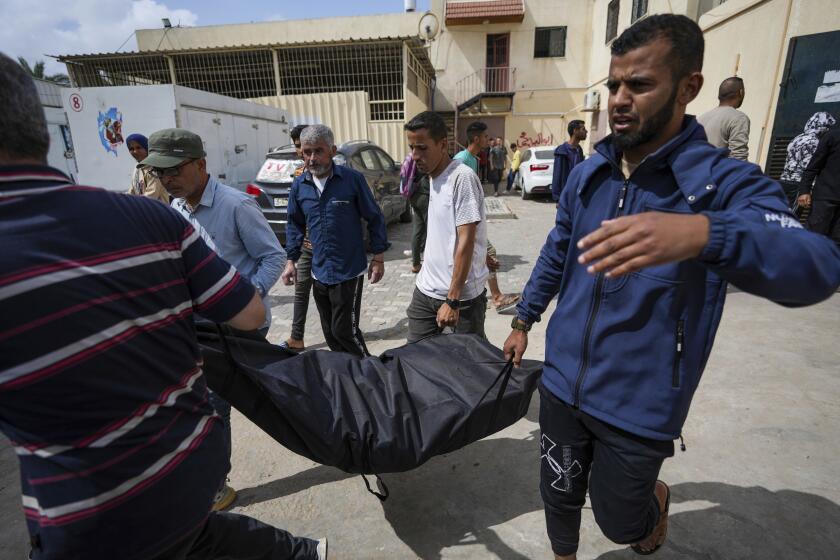Some see worsening rights situation in aid donor ‘darling’ Ethiopia
Like many in the West, former U.S. Ambassador to Ethiopia David Shinn watched the country’s recent elections for signs that democracy was finally taking root.
When the results of the May vote were announced, all but two of 547 parliamentary seats went to the Ethiopian People’s Revolutionary Democratic Front, the coalition that has been in power here for nearly 20 years, or its allied parties.
“How do you win 99% of the vote?” Shinn said. “That’s un-American.” And yet, he said, “Ethiopia remains a darling of the donor community.”
The U.S. gives about $1 billion annually to Ethiopia, more than to any other country in sub-Saharan Africa except Sudan. But even as U.S. and other international aid to Ethiopia has surged in the last decade, activists charge that the government has become more authoritarian.
“There’s been an inverse ratio of rising donor aid and a worsening human rights record,” said Leslie Lefkow, a researcher with Human Rights Watch.
Prime Minister Meles Zenawi’s government has won a degree of favor from the West for sending troops to fight radical Islamists in neighboring Somalia, but reports of rights abuses and a string of draconian laws that have constricted political space have put donor countries in an awkward position.
“It’s a dilemma for the international donor community, which doesn’t want to walk away from Ethiopia because the needs are so great,” said Jennifer Cooke, the director of the Africa program at the Center for Strategic and International Studies.
Recent allegations of aid corruption have caused further unease among donor countries.
A March report by Human Rights Watch alleged a countrywide pattern of local government leaders denying aid to opposition supporters. Eligibility for many major aid programs is determined by local government officials — almost all of whom belong to the ruling coalition or its affiliates.
One former Ethiopian aid worker, who didn’t want to be named out of fear of government retribution, told The Times that aid is leveraged by local leaders to consolidate power.
“Aid is a tool for development,” the aid worker said. “It is also a tool for politics.”
Ethiopian officials deny such claims. Communications Minister Bereket Simon said Human Rights Watch was “engaged in the continuous fabrication of allegations” and said Ethiopia “has put in place a transparent mechanism for the distribution of food aid.”
But Western donors appear to be taking the allegations seriously.
Claims that aid programs had fallen victim to political distortion prompted an investigation into U.S.-funded food programs in seven local districts in December 2009, said an official with the U.S. Agency for International Development.
The probe “found no indication of political discrimination,” the official said.
A report released last week by a consortium of donors that includes the U.S., several European countries and the World Bank conceded that Western aid programs would benefit from more transparency and independent monitoring.
The Donor Assistance Group report said donor countries would work with the Ethiopian government “for continued strengthening of safeguards” against fraud.
Africa experts agree that walking away from Ethiopia is out of the question.
Almost a sixth of Ethiopia’s 85 million people depend on food aid. In an added geopolitical dimension, twin bombings in Uganda last month by the Al Qaeda-linked Somali militant group Shabab underscored the importance of having U.S. allies in the troubled Horn of Africa.
Ethiopia’s rise to “donor darling” is due in large part to its savvy leader, Cooke said.
Meles, the former Marxist guerrilla leader who has ruled Ethiopia since 1991, “is good at talking the donor speak and the rhetoric of development,” she said.
Hailed by former President Clinton as part of a new generation of African leaders who would bring stability to the continent, Meles was invited to sit on then-British Prime Minister Tony Blair’s Commission for Africa in 2004.
The commission argued that economic growth and democracy would come to Africa only after hunger, poverty and the spread of disease were stamped out — an expensive proposition that required a “big push” of new aid.
The year after he was named to the commission, security forces loyal to Meles killed nearly 200 people who were protesting that year’s election and arrested tens of thousands of opposition supporters, including Birtukan Mideksa, an opposition leader who is now serving life in prison for violating the conditions of a 2007 pardon.
The U.S. has been cautious in its criticism, although some say the Obama administration has been taking a tougher tone. In May, a top U.S. diplomat said the recent elections “were not up to international standards.”
Meles bristles at such statements and has suggested that Ethiopia could forgo its dependence on Western aid for a closer relationship with China, which has lent money for a dizzying number of development projects in recent years.
“If [the U.S.] feels the outcome of the elections are such that we cannot continue our relationship,” he warned in May, “that’s fine and we can move on.”
kate.linthicum@latimes.com
More to Read
Start your day right
Sign up for Essential California for news, features and recommendations from the L.A. Times and beyond in your inbox six days a week.
You may occasionally receive promotional content from the Los Angeles Times.







